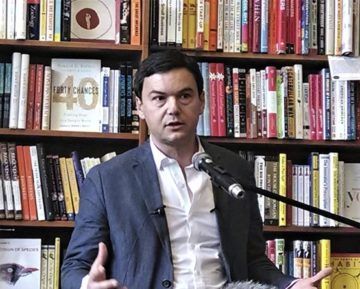John Plotz and Adaner Usmani in Public Books:
 The Paris-based economist Thomas Piketty gained worldwide fame in 2014 for his Capital in the Twenty-First Century, which analyzed rising inequality in the modern world and offered new ways to understand data on income, wealth accumulation, and the changing value of labor. In 2020 he followed with another similarly massive, similarly impressive tome, Capital and Ideology, which looks at the belief systems that underly that data. In it he asks the kind of question economic historians tend to shy away from: Where does inequality come from and why do societies naturalize and put up with it? Put another way: Why aren’t we all screaming?
The Paris-based economist Thomas Piketty gained worldwide fame in 2014 for his Capital in the Twenty-First Century, which analyzed rising inequality in the modern world and offered new ways to understand data on income, wealth accumulation, and the changing value of labor. In 2020 he followed with another similarly massive, similarly impressive tome, Capital and Ideology, which looks at the belief systems that underly that data. In it he asks the kind of question economic historians tend to shy away from: Where does inequality come from and why do societies naturalize and put up with it? Put another way: Why aren’t we all screaming?
This article is a condensed transcript of a conversation between Professor Piketty and a sociologist and a literature professor, each with their own (at times divergent!) investments in his account of how cultures and their belief systems shape material economic facts … and vice versa.
More here.
